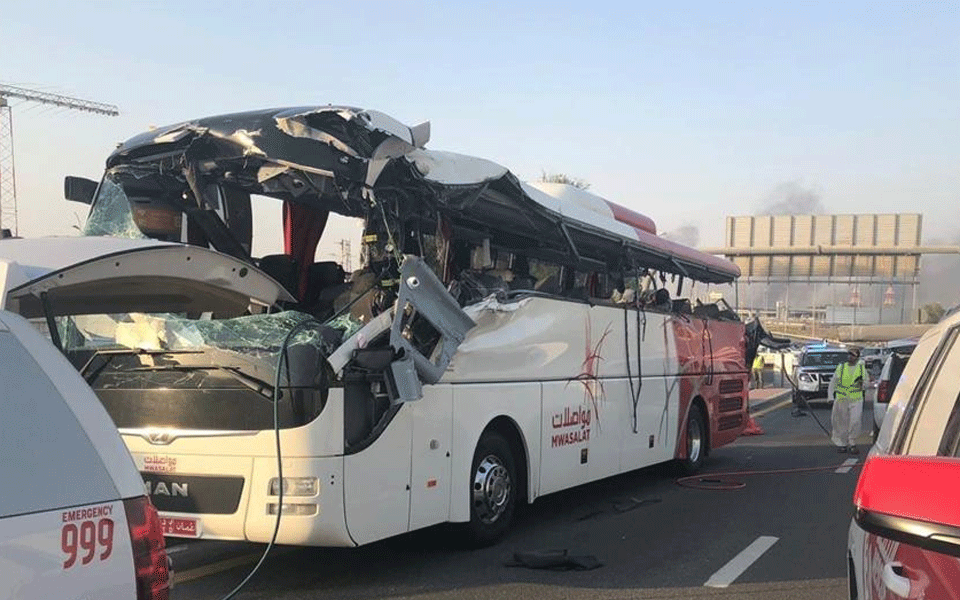Dubai: The lawyers of the Omani bus driver, who rammed the vehicle into a height barrier in Dubai that killed 17 people including 12 Indians, have told a UAE court that the restriction bar violated the GCC safety guidelines.
Twelve Indians were among the 17 people killed in the horrific bus accident on June 7 when the bus, coming from Oman, wrongly entered a road not designated for buses and crashed into a height barrier that cut the left side of the bus and killed passengers sitting on that side.
The other deceased include two Pakistanis, one Omani and one Filipina.
Mohammad Al Tamimi, one of the two lawyers representing the driver, told the Dubai Traffic Court that the distance between the warning signboard and the height barrier was only 12 metres, the Gulf News reported Tuesday.
The mistake is in the place of the height barrier according to the pictures in the accident scene. The Gulf Cooperation Council (GCC) guideline for positioning advance warning signs states that if the road's speed limit is 60km/h, then the distance between the signboard or height restriction chain and the height barrier should be 60 metres, not 12 metres in our case, Al Tamimi told the court.
According to Traffic Prosecution, the speed limit on that road is 40 km/h.
The Dubai Police blamed the 53-year-old Omani driver, who was moderately injured, for the accident, saying "at times a small mistake or negligence can lead to adverse consequences".
It was too short a distance to stop the vehicle. It is not the defendant's mistake and not his negligence. Putting the height barrier in a wrong place caused the accident, Al Tamimi said.
Al Tamimi claimed there is no proof that the defendant was driving the bus at 94kph when the crash happened.
He asked the court to assign a specialised engineer from the Roads and Transport Authority (RTA) to inspect the crash site and make a report of the positioning of warning signboards and the height barrier, the report said.
Meanwhile, the second defence lawyer Mohammed Al Sabri accused the RTA of eight mistakes found by a report prepared by the company that owns the bus.
He submitted a copy of the report to the court and requested the appointment of an expert to examine the accident location and check if the mistakes were committed by the RTA.
The reason behind the accident was the solid height barrier and its positioning. The sun at the time of the accident [5pm] blurred the signboards to the driver. The confession of the driver is not enough to convict him, Al Sabri told the judge.
Last week, prosecutor Salah Bu Farousha Al Felasi, director of Traffic Prosecution, said the driver couldn't follow the signboards as the sun shade had obstructed his view.
He admitted to lowering the sun shade and didn't notice the signboards or warning signs, despite having used the road several times before the accident, said Al Felasi.
His reckless driving, not paying attention to the road and his speeding, caused the disaster, he added.
The verdict in the case is expected on July 11, while the defendant will remain under police custody.
Let the Truth be known. If you read VB and like VB, please be a VB Supporter and Help us deliver the Truth to one and all.
New Delhi (PTI): West Bengal Chief Minister Mamata Banerjee has filed a petition in the Supreme Court against the ongoing Special Intensive Revision (SIR) of the electoral rolls in the state, sources said on Sunday.
The petition names the Election Commission (EC) and the chief electoral officer of West Bengal as respondents. It was filed before the apex court on January 28, the sources said.
Banerjee arrived in Delhi on Sunday. She is scheduled to meet Chief Election Commissioner (CEC) Gyanesh Kumar at 4 pm on Monday to discuss the ongoing SIR exercise in West Bengal. The Trinamool Congress (TMC) supremo would be accompanied by a delegation of party leaders.
She is also likely to meet party MPs in the Parliament House on Monday.
Talking to reporters at the Kolkata airport before leaving for the national capital, Banerjee claimed that the ruling Bharatiya Janata Party (BJP) at the Centre is resorting to the SIR exercise because it is certain of its imminent defeat in the West Bengal Assembly polls, due in a few months, and said the saffron party should contest the election politically and democratically.
The West Bengal chief minister has written several letters to the CEC, raising concerns over the conduct of the exercise.
In her most recent letter to the CEC on January 31, she alleged that the methodology and approach of the exercise went beyond the provisions of the Representation of the People Act and the relevant rules, causing "immense inconvenience and agony" to citizens.
Earlier, TMC leaders, including Rajya Sabha MPs Derek O'Brien and Dola Sen, had moved the apex court, challenging certain aspects of how the SIR is being carried out in West Bengal.





